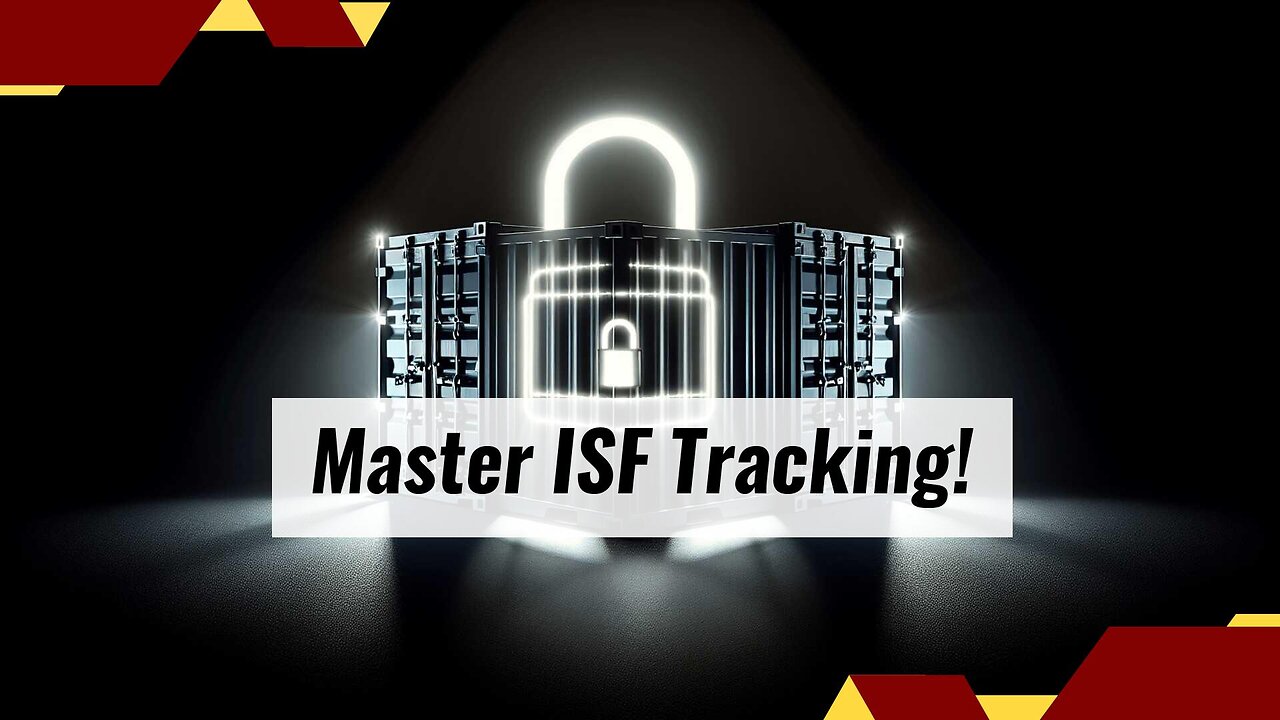Premium Only Content

Mastering ISF Compliance: Real-Time Tracking and Reporting for Customs Brokers
ISF Checklist || 805-970-7918 || contact@isfchecklist.com || www.isfchecklist.com
In this video, we discussed the best practices for mastering Importer Security Filing (ISF) compliance, with a specific focus on real-time tracking and reporting. We highlighted the importance of monitoring and reporting crucial data related to shipments to ensure compliance with ISF requirements and maintain smooth operations throughout the supply chain.
To master ISF compliance, it is essential to have a comprehensive checklist that covers all the necessary tasks involved in the filing process. This includes gathering and verifying required information, submitting the ISF filing, and updating any changes as they occur. By following a checklist, customs brokers can streamline their operations and minimize the risk of overlooking important steps.
Another critical aspect of ISF compliance is having a customs bond in place. A customs bond serves as a financial guarantee to the government that all duties, taxes, and fees related to the imported goods will be paid. It provides assurance to the authorities that the importer is committed to complying with all applicable regulations.
Proper documentation is crucial to ensure accuracy and efficiency in ISF compliance. Customs brokers must carefully review all shipment-related paperwork, including commercial invoices, bills of lading, and packing lists. This helps to verify the accuracy of the information provided and ensures that the ISF filing contains all the necessary details.
Utilizing technology and automation can greatly enhance ISF compliance practices. Customs brokers should leverage software platforms specifically designed for submitting ISF filings. These platforms enable them to electronically transmit the required information directly to the US Customs and Border Protection (CBP) in a streamlined and efficient manner, reducing the likelihood of errors and speeding up the filing process.
It is imperative for customs brokers to establish strong partnerships within the global trade network. By collaborating with reliable and trusted vendors, suppliers, and carriers, brokers can ensure that all parties involved are aligned with compliance requirements. This collaboration helps to streamline communication, enhance data accuracy, and mitigate any potential risks associated with ISF compliance.
Regular internal audits and continuous monitoring of ISF compliance are crucial to identify any potential gaps or areas for improvement. Customs brokers should regularly review their processes, address any compliance issues, and update their practices as needed. By proactively managing compliance, brokers can minimize the risk of penalties, shipment delays, or even the suspension of their customs privileges.
Finally, staying up to date with industry regulations and changes is vital for mastering ISF compliance. Customs brokers should invest time in learning about any amendments or updates to import regulations, trade agreements, or security protocols. Continuous education and training ensure that brokers can provide accurate guidance to their clients and adapt to evolving compliance requirements.
Thank you for joining us today as we explored the best practices for mastering Importer Security Filing compliance, focusing on real-time tracking and reporting. Stay tuned for our upcoming videos, where we will continue to delve into the world of customs brokerage and international trade. Don't forget to like, subscribe, and hit the notification bell to stay updated with our latest content. Until next time!
#usimportbond #isfcustomsbroker #uscustomsclearing #isfentry
Video Disclaimer Here: This video is purely educational and has no ties with the US government.
00:33 Real-time tracking and reporting are essential for Importer Security Filing (ISF) compliance. Customs brokers can monitor crucial data to prevent issues and maintain smooth supply chain operations.
00:52 A comprehensive checklist is necessary for mastering ISF compliance. It should cover all tasks, from gathering information to updating changes, to streamline operations and avoid oversights.
1:17 Having a customs bond is critical for ISF compliance. It serves as a financial guarantee to ensure duties are paid, and without it, shipments may face delays or entry refusal.
2:16 Proper documentation review, technology utilization, strong partnerships, regular audits, and staying updated on regulations are key strategies for efficient ISF compliance.
-
 3:03:51
3:03:51
FreshandFit
6 hours agoAfter Hours w/ Girls
56K65 -
 1:45:26
1:45:26
Kim Iversen
11 hours agoBANNED for Telling the Truth: The 9/11 and Epstein Plot They Don't Want You To Hear
98.6K127 -
 1:08:47
1:08:47
Man in America
13 hours agoDr. Makis EXPOSES Big Pharma’s SICK Vaccine Scam—RFK Jr. Must Act NOW!
88K21 -
 1:28:21
1:28:21
Glenn Greenwald
11 hours agoRFK Jr. Hearing Reveals DC Pro-Pharma Consensus; Trump's Executive Order to Deport Student Protesters Criticizing Israel; Untangling DC Think Tank Funding & Influence | SYSTEM UPDATE #399
135K165 -
 1:23:44
1:23:44
Space Ice
12 hours agoSpace Ice & Redeye: Van Damme's The Quest: Pirates, Clowns, James Bond & Bloodsport
44.3K3 -
 59:57
59:57
The StoneZONE with Roger Stone
9 hours agoJ6 Martyr Enrique Tarrio Describes Inhumane Prison Conditions Ordered by Biden | The StoneZONE
41.3K4 -
 16:48
16:48
Tundra Tactical
9 hours ago $6.09 earnedAffordable Medical Gear From ACETAC SHOT Show 2025
63.9K3 -
 1:46:16
1:46:16
Redacted News
12 hours agoRFK CONFIRMATION: Kennedy goes to WAR with Big Pharma Democrats in Fiery Hearing | Redacted Live
250K420 -
 57:31
57:31
Candace Show Podcast
12 hours agoBREAKING! Taylor Swift Turns Against Blake Lively & Ryan Reynolds | Candace Ep 141
229K180 -
 1:04:59
1:04:59
Sarah Westall
9 hours agoRFK Jr Report, Constitution Suspended, War Time Procedures in Place, WHO Exit, DOD w/ Sasha Latypova
72.9K35